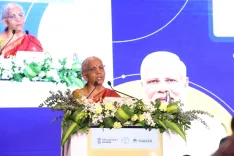How Are India and South Korea Strengthening Their Tech-Driven Partnership in Chips and Green Energy?

Synopsis
Key Takeaways
- India and South Korea are focusing on semiconductors and renewable energy.
- The New Southern Policy facilitates strategic partnerships.
- India aims to be a global semiconductor hub by 2030.
- Collaboration includes joint R&D in emerging technologies.
- Renewable energy cooperation is vital for both nations' climate goals.
New Delhi, Oct 15 (NationPress) In recent years, the relationship between India and South Korea has transformed into a strategically vital alliance, emphasizing technology-driven collaboration in semiconductors and sustainable energy.
This focus on semiconductors and energy signifies a shift from conventional trade relations to in-depth technological cooperation, which is crucial for securing a competitive future in a global landscape marked by geopolitical tensions and supply chain realignments, as noted in an article from India Narrative.
South Korea’s New Southern Policy serves as the diplomatic framework aimed at converting economic and technological partnerships into a robust strategic alliance, enhancing the influence of both nations in the Indo-Pacific, the article highlights.
The semiconductor collaboration closely aligns with India’s national goal of establishing itself as a global semiconductor hub by 2030. Through the India Semiconductor Mission and various policy incentives, India is constructing fabrication plants and developing a comprehensive supply chain that spans chip design, manufacturing, assembly, testing, and packaging.
South Korea, home to semiconductor powerhouses Samsung and SK Hynix, brings critical expertise, investment, and technology, positioning it as an ideal partner in this essential sector, the article notes.
Joint research and development in emerging semiconductor technologies—like AI chips and 3D packaging—backed by collaborative innovation hubs, will be vital for decreasing India’s reliance on China-centric supply chains and bolstering its technological autonomy, the article emphasizes.
India’s initiative to cultivate a skilled semiconductor workforce through targeted educational programs and public-private partnerships aims to ensure the long-term viability of this ecosystem. Further, supporting fabless semiconductor design startups will enhance manufacturing efforts by utilizing India’s extensive talent pool in chip design, thereby integrating the country deeper into the global semiconductor value chain, as the article states.
The energy aspect of the India-Korea relationship also plays a transformative role, particularly in the areas of renewable energy and clean technology collaboration. India’s ambitious renewable energy goals and the National Green Hydrogen Mission are well-aligned with South Korea’s advanced capabilities in solar, wind, energy storage, and green hydrogen. This complementary expertise paves the way for joint ventures, technology transfer, and project development that will expedite India’s transition to sustainable energy.
The article also underscores that future energy cooperation will increasingly focus on innovative battery storage solutions, which are crucial for stabilizing power grids amidst the rising integration of renewable energy. India perceives Korean investment and expertise as essential for scaling up domestic production of clean energy technologies, thereby reducing carbon emissions and progressing towards climate objectives through high-quality, green industrial development.









